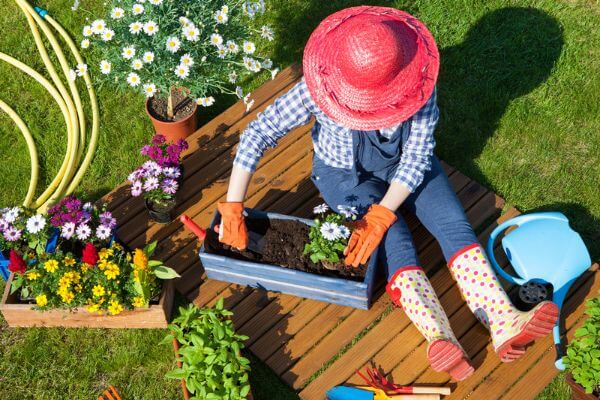Gardening is a fantastic activity that helps relieve stress for me. When I left home after high school, I left my love of gardening behind and foolishly did not realize what an integral part of my being it was. What I failed to realize is that gardening was not just a chore, it was a super healthy activity for the body and mind. So glad I’ve re-discovered it.
In today’s fast-paced world, stress has become an inevitable part of our lives. With the constant hustle and bustle, it’s easy to get overwhelmed by the pressures of daily life. But did you know that there’s a simple yet effective way to combat stress? Gardening! That’s right, gardening has been proven to be a great way to reduce stress and improve mental well-being.
From planting seeds to watching them grow, gardening can be a therapeutic and rewarding experience. In this article, we’ll explore the benefits of gardening and how it can help you find serenity amidst the chaos of everyday life. So grab your gardening tools and let’s get started on the journey from seed to serenity!
How Simple Gardening Helps Relieve Stress
The Science Behind How Gardening Helps Relieve Stress
Gardening has been around for centuries and has been praised for its therapeutic benefits. But what is it about gardening that helps reduce stress? The answer lies in the science behind it. According to a study published in the Journal of Health Psychology, gardening can help reduce cortisol levels, a hormone associated with stress. The study found that gardening for just 30 minutes can significantly lower cortisol levels in the body.
In addition to reducing cortisol levels, gardening also stimulates the release of endorphins, the body’s natural feel-good chemicals. The physical activity involved in gardening, such as digging, planting, and weeding, can also help improve mood and reduce anxiety.
Benefits of Gardening for Mental Health
Gardening offers a variety of benefits for mental health. In addition to reducing stress and anxiety, gardening can also improve mood, increase self-esteem, and provide a sense of accomplishment. It can also help improve sleep quality, which is essential for overall well-being.
Gardening can also be a great way to practice mindfulness, a mental state characterized by being present in the moment and aware of one’s thoughts and feelings. Mindfulness has been shown to reduce stress and improve mental health. Gardening can help you focus on the present moment, which can help you let go of worries and stressors.
How to Start a Garden – Choosing the Right Plants and Location
Starting a garden can be a fun and rewarding experience, but it’s important to choose the right plants and location. When choosing plants, consider your climate and soil type. Some plants thrive in certain climates and soil types, so it’s important to do your research before planting.
When choosing a location for your garden, consider the amount of sunlight and shade the area receives. Most plants require at least six hours of sunlight a day, so choosing a sunny location is important. It’s also important to choose a location that is easily accessible and convenient for watering and maintenance.
Tips for Maintaining a Garden
Maintaining a stress-free garden can be challenging, but with a few tips, it can be a breeze. One of the easiest ways to maintain a stress-free garden is to keep it simple. Choose low-maintenance plants that require minimal watering and pruning. This will help reduce the amount of time and effort required to maintain your garden.
Another tip for maintaining a stress-free garden is to keep it organized. This can be achieved by using garden markers to identify plants, creating paths to easily navigate through the garden, and using containers to keep plants contained.
Mindful Gardening Techniques for Stress Relief
As mentioned earlier, gardening can be a great way to practice mindfulness. Here are a few mindful gardening techniques that can help reduce stress and improve mental well-being:
- Focus on your breath while gardening. Take deep breaths and focus on the sensations of your breath as you plant, weed, or water your garden.
- Engage your senses. Take time to smell the flowers, feel the soil between your fingers, and listen to the sounds of nature.
- Practice gratitude. Take a moment to appreciate the beauty of your garden and the hard work you’ve put into it.
- Take breaks. It’s important to take breaks while gardening to avoid burnout. Take a few moments to stretch, hydrate, or simply sit and enjoy the beauty of your garden.
Incorporating Aromatherapy and Color Therapy in Your Garden
Aromatherapy and color therapy can be great additions to your garden for stress relief. Aromatherapy involves using essential oils to promote relaxation and reduce stress. Lavender, chamomile, and peppermint are popular essential oils for relaxation and stress relief. You can add these oils to a diffuser or spray bottle and use them in your garden.
Color therapy involves using colors to promote relaxation and reduce stress. Blue and green are calming colors that can help reduce anxiety and promote relaxation. Incorporating blue and green plants and decorations in your garden can help promote a sense of calm and serenity.
Creative Ways to Use Your Garden for Stress Relief – Meditation and Yoga
Your garden can be a great space for meditation and yoga. Practicing these activities in nature can help improve mental well-being and reduce stress. Find a quiet spot in your garden and set up a meditation cushion or yoga mat. Take a few moments to focus on your breath and connect with nature. Practicing yoga or meditation in your garden can help you feel more grounded and connected to the world around you.
Community Gardening and Social Connections
Community gardening can be a great way to connect with others and reduce stress. Community gardens are shared spaces where individuals can grow their own fruits, vegetables, and flowers. These gardens provide a sense of community and connection, which can be beneficial for mental well-being. In addition, community gardening can provide opportunities for physical activity and fresh air, which are essential for overall well-being.
The Importance of Incorporating Gardening in Your Self-Care Routine
Gardening offers a variety of benefits for mental health and well-being. From reducing stress and anxiety to improving mood and self-esteem, gardening can be a great way to take care of your mental health. Whether you’re starting a garden in your backyard, practicing mindfulness techniques, or joining a community garden, there are many ways to incorporate gardening into your self-care routine. So grab your gardening tools and start planting!
“For many people gardening relaxes the spirit, mind, and body. Actually, it is not “gardening” that’s relaxing, but the way that we approach it. If gardening is seen as a chore, it’s stressful. If we view it as enjoyable, it can help relieve stress.”
Read: Sherry Rindels, Department of Horticulture, Iowa State University
“Fresh air is full of oxygen and it provides health to the cells in our bodies. Fresh air can help us feel more energized and even help us sleep better at night. Being outside in the fresh air promotes a sense of well-being and good mental focus.”
Read: Sound-Mind.org
“Either strategy can activate the parasympathetic nervous system—the body system that counteracts the physiological changes brought on by stress.”
Read: Psychology Today – Nine Ways to Relieve Stress by Gardening
Conclusion
It is our wish that you find this post enlightening and helpful. If you have any questions or suggestions, we love to hear from you in the comments below. Also, kindly accept our invitation to join our group on Facebook to surround yourself with kindred spirits and post your encouraging messages.









































